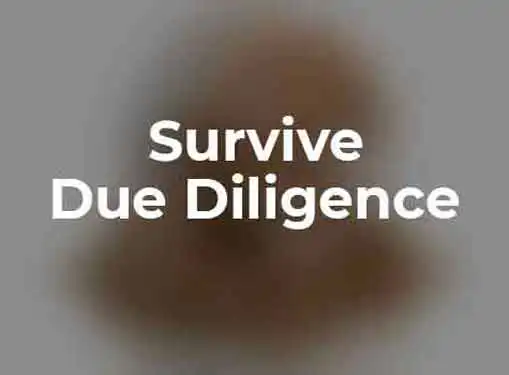How to Sell a Business
Surviving Buyer Due Diligence
Selling a business? If so, it's very important to be prepared for due diligence by the buyer.
The due diligence process has a reputation for being rough on sellers.

Buyers want as much information as they can get and they aren't shy about getting it. As a seller, you can't avoid due diligence – but you can minimize its impact on your company.
Due diligence is a buyer's investigation of a business prior to its purchase. It is designed to turn up any hidden factors that could place the buyer's investment at risk including financial, market, legal, and other threats that have not yet been disclosed. Naturally, the buyer wants the due diligence process to be as thorough as possible. But in their eagerness to leave no stone unturned, buyers often fail to recognize that sellers have rights during due diligence, too. Since the buyer will be preoccupied (possibly even obsessed) with gathering information, you'll need to be the one who establishes boundaries throughout the process.
Timing
The due diligence process should not begin until the buyer and seller have reached an agreement and entered into a sales contract. Some buyers mistakenly assume that due diligence begins the moment they express interest in the business. But in fact, until the due diligence process begins, the amount of information that is released to the buyer is almost entirely up to the seller. Staging the release of information shouldn't be used as a tool to conceal negatives, but instead as a way to make sure sensitive data is only released to serious buyers.
Preparation
It's beneficial to diligently prepare for due diligence before you put your business on the market. Work with your accountant to make sure the financials are in good order, and compile information about the company's legal and market status in a form that can be clearly understood by someone who isn't intimately familiar with your company. If this isn't done in advance, you'll have to do it with a buyer breathing down your neck – which could create the impression that you are either being obstructive or trying to hide something.
Duration
Due diligence does not go on for an unlimited time period. If you have properly prepared for the due diligence process, a couple of weeks should be enough for the buyer to gather all the information he needs to make an informed buying decision. It's important that due diligence be discussed before it begins and that the timeframe is specified in the due diligence clause of the sales contract.
Confidentiality
Without exception, buyers who reach the due diligence phase must sign a confidentiality agreement. If something arises during due diligence and they choose to back out of the sale, you need to make sure your information doesn't become public knowledge. An additional twist occurs if you are trying to keep the sale secret and the buyer wants to talk to employees, vendors, or clients. You may need to limit access to a few individuals from each category. The buyer won't like it, but it might be the only way to ensure confidentiality about the sale.
Follow-Up
Several things can occur after the due diligence process has ended. The buyer can either accept the purchase price as is, or renegotiate based on concerns he discovered during his investigation. Chances are that he will try to use due diligence to negotiate a lower price, so be prepared to respond to his concerns with facts.
Share this article
Additional Resources for Entrepreneurs


Conversation Board
Have we covered everything you need to know about surviving buyer due diligence? What have we forgotten to address? Please share your comments with the other entrepreneurs who visit our site.